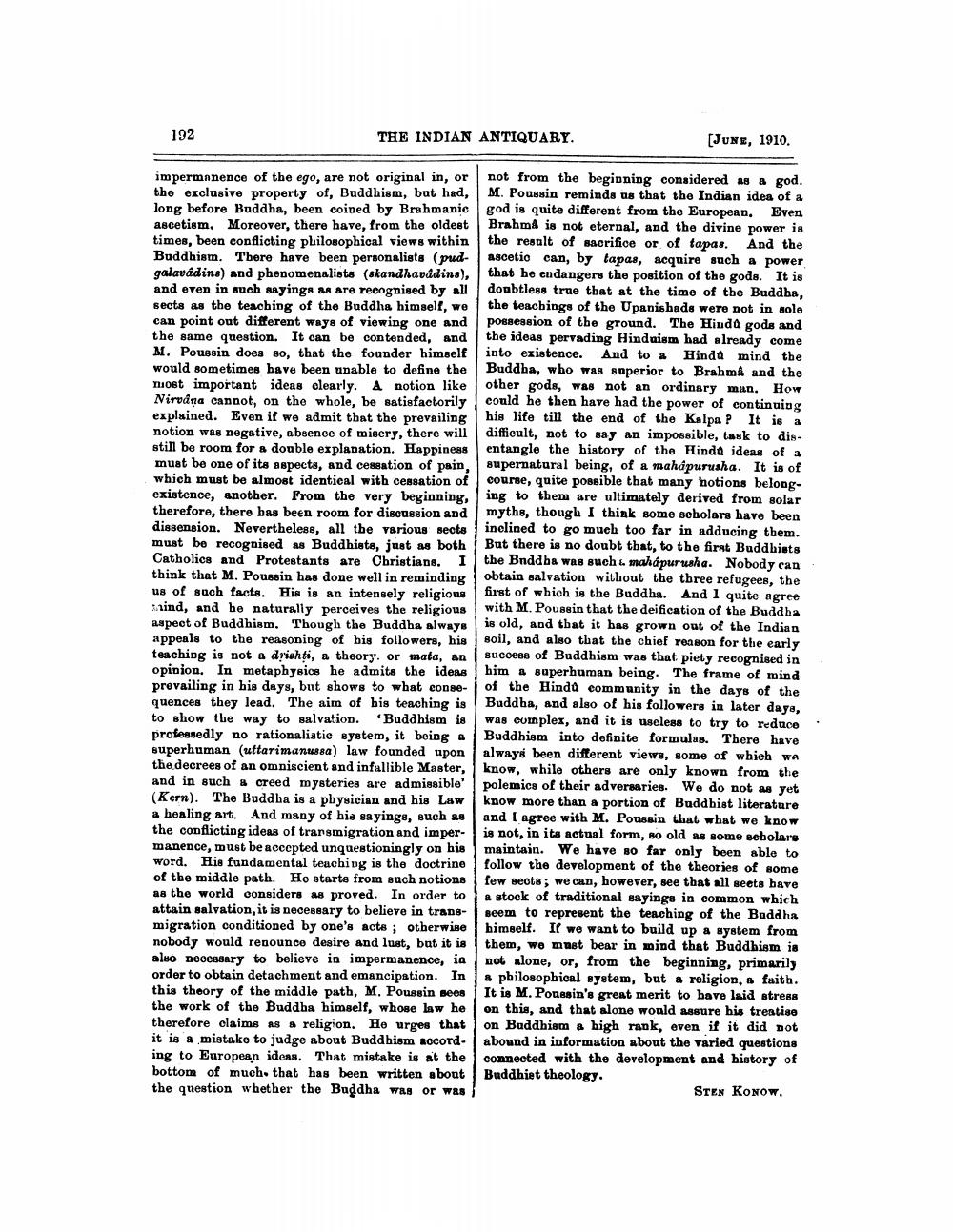________________
192
THE INDIAN ANTIQUARY.
(JUNE, 1910.
impermanence of the ego, are not original in, or not from the beginning considered as a god. tho exclusive property of, Buddhism, but had, M. Poussin reminds us that the Indian idea of a long before Buddha, been coined by Brahmanic god is quite different from the European, Even ascetism. Moreover, there have, from the oldest Brahm& is not eternal, and the divine power is times, been conflicting philosophical views within the result of sacrifice or of tapas. And the Buddhism. There have been personalists (pud- ascetio can, by tapas, acquire such a power galavadins) and phenomenalists (skandhavddins), that he endangers the position of the gods. It is and even in such sayings as are recognised by all doubtless true that at the time of the Buddha, sects as the teaching of the Buddha himself, we the teachings of the Upanishads were not in sole can point out different ways of viewing one and possession of the ground. The Hindd gods and the same question. It can be contended, and the ideas pervading Hinduism had already come M. Poussin does so, that the founder himself into existence. And to & Hinda mind the would sometimes bave been unable to define the Buddha, who was superior to BrahmA and t most important ideas clearly. A notion like other gods, was not an ordinary man. How Nirvana cannot, on the whole, be satisfactorily could he then have had the power of continuing explained. Even if we admit that the prevailing
his life till the end of the Kalpa ? It is a notion was negative, absence of misery, there will difficult, not to say an impossible, tank to disstill be room for a double explanation. Happiness entangle the history of the Hindo ideas of a must be one of its aspects, and cessation of pain, supernatural being, of a mahapurusha. It is of which must be almost identical with cessation of course, quite possible that many notions belongexistence, another. From the very beginning, 1 ing to them are ultimately derived from solar therefore, there has been room for discussion and myths, though I think some scholars have been dissension. Nevertheless, all the various sects inclined to go much too far in adducing them. must be recognised as Buddhists, just as both But there is no doubt that, to the first Buddhists Catholics and Protestants are Cbristians. I the Bnddba was such mahápurusha. Nobody can think that M. Poussin has done well in reminding obtain salvation without the three refugees, the us of such facts. His is an intensely religious first of which is the Buddha. And I quite agree mind, and he naturally perceives the religious
with M. Poussin that the deification of the Buddba aspect of Buddhism. Though the Buddha always is old, and that it has grown out of the Indian appeals to the reasoning of bis followers, his soil, and also that the chief reason for the early teaching is not a drishti, a theory. or mata, an success of Buddhism was that piety recognised in opinion. In metaphysics he admits the idens him superhuman being. The frame of mind prevailing in his days, but shows to what conse-of the Hinda community in the days of the quences they lead. The aim of his teaching is Buddha, and also of his followers in later daya, to show the way to salvation. Buddhism is was complex, and it is useless to try to reduce professedly no rationaliatie system, it being a Buddhism into definite formulas. There have superhuman (uttarimanussa) law founded upon always been different views, some of which wa the decrees of an omniscient and infallible Master, know, while others are only known from the and in such a creed mysteries are admissible polemics of their adversaries. We do not as yet (Kern). The Buddha is a physician and his Law know more than a portion of Buddhist literature a healing art. And many of his sayinge, such as and I agree with M. Poussin that what we know the conflicting ideas of trangmigration and imper- is not, in its actual form, so old as some sobolars manence, must be accepted unquestioningly on his maintain. We have so far only been able to word. His fundamental teaching is the doctrine follow the development of the theories of some of the middle path. He starte from such notions few seots; we can, however, see that all seets have as the world considers as proved. In order to a stock of traditional sayings in common which attain salvation, it is necessary to believe in trans- seem to represent the teaching of the Buddha migration conditioned by one's acte ; otherwise himself. If we want to build up a system from nobody would renounce desire and lust, but it is them, wo mnst bear in mind that Buddhism is aluo necessary to believe in impermanence, ia not alone, or, from the beginning, primarily order to obtain detachment and emancipation. In * philosophical system, but a religion, faith. this theory of the middle path, M. Poussin sees It is M. Poussin's great merit to have laid stress the work of the Buddha himself, whose law he on this, and that alone would assure his treatise therefore claims As a religion. He urges that on Buddhism a high rank, even if it did not it is a mistake to judge about Buddhism socord. abound in information about the varied questions ing to European ideas. That mistake is at the connected with the development and history of bottom of much that has been written about Buddhiet theology. the question whether the Buddha was or was
STEN KONow.




